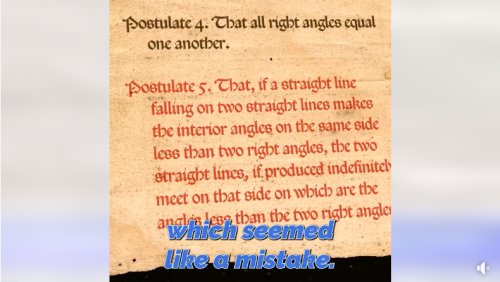After three posts about that Jonathan Rauch book, let’s post some items about conclusions made by the reality-based community.
- Veritasium on Euclid’s Fifth Postulate, and how there is more to reality than human intuitive thinking;
- Neil de Grasse Tyson on how scientific debate works;
- Neil de Grasse Tyson on thinking exponentially;
- Neil de Grasse Tyson on how people believe things known for centuries to be not true.
Veritasium, 9 Nov: How One Line in the Oldest Math Text Hinted at Hidden Universes…
Veritasium on the science of parallels. A good example of how intuitive thinking by humans is blinkered thinking, and how reality is bigger than human experience. In this case, an intuitive idea about parallel lines seemed to be inconsistent with other math postulates. The breakthrough: that there are other geometries than the one humans intuitively perceive, in which “parallel” lines mean different things, and there can be more than one line parallel to a first line and through a single point.
Also a good illustration of how mathematics has developed. You can’t define everything in terms of all the other things (as dictionaries do with words); you have to establish certain ‘postulates’ that are ‘self-evident’ and build all of mathematics up from them. But if you choose different postulates, whether they seem self-evident or not, you can derive different mathematics.
Like logic: start with different assumptions, you can ‘prove’ anything. That’s why logic doesn’t produce new knowledge. It needs a basis in empirical reality to be useful.
\\\
Facebook reel: Neil deGrasse Tyson on how science works
I will transcribe his entire speech.
In a scientific debate, you and I know, walking into that room, either I’m right and you’re wrong, or you’re right and I’m wrong, or we’re both wrong. We know that in advance. So we start having the conversation. What about these data? I think those data are flawed and here’s why. Well how about this? Yes, that’s a debate. But you know how that debate ends? It ends where we need this new data set to resolve this difference. Now let’s go have a beer. I have never seen that happen in a political debate, nor with two lawyers in a courtroom. “You know I have never thought about it that way. Good idea. I concede.” Has that ever happened? I think the answer to that is no.
This is the ‘constitution of knowledge’ at its strongest, with science; and this is why I’m not fully convinced by Rauch’s inclusion of politics, or the law, in his argument. Politicians and lawyers don’t debate to find the best solution, any more than theologians do; they argue to win.
\\\
Facebook reel: Neil deGrasse Tyson on How can we think exponentially?
Humans think linearly, not exponentially. In fact, humans have difficulty intuiting numbers larger than… four. It’s said that some primitive societies have no numbers beyond one, two, three… After that: many. For scientists to deal with vast numbers, when confronting the size or age of the universe, they resort to exponential notation, to be able to manipulate numbers they have no intuitions about.
This was a point I made in the essay I placed in the Gary Westfahl book, because it’s a limitation in human cognition that results in dishonest science fiction, especially in TV and movie science fiction, that ignores the realities of the vastness of time and space and instead projects our local notions of distance and time onto the greater universe. Thus, as some wag remarked, in Star Wars, it takes only 15 minutes to get anywhere.
\\\
Facebook reel: Neil deGrass Tyson on how The Ancient Greeks Weren’t Flat Earthers
How the public believes so many things that we’ve known for years and centuries are not true. The world isn’t flat; there are no sounds in space; chicken soup doesn’t actually cure disease; cold air does not cause pneumonia.









